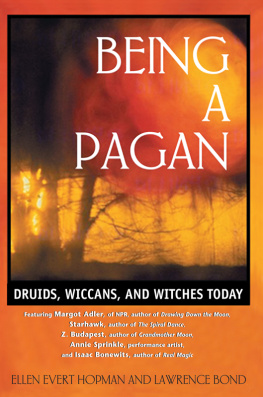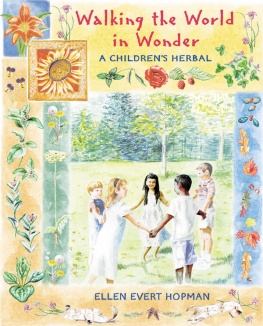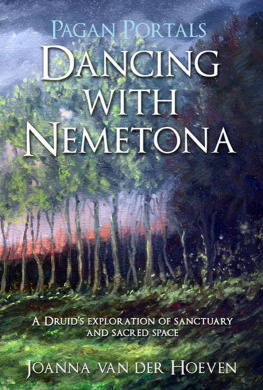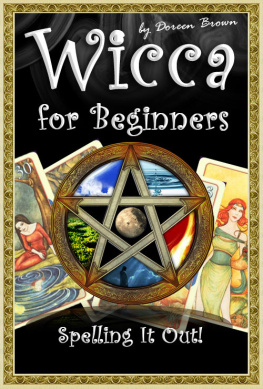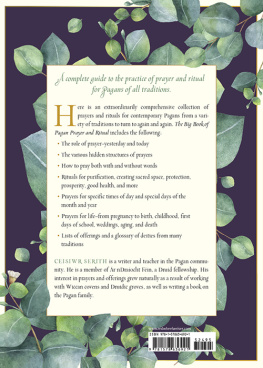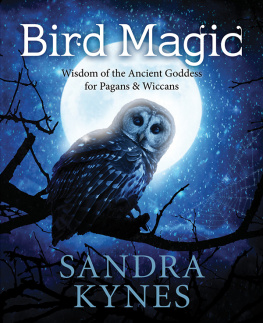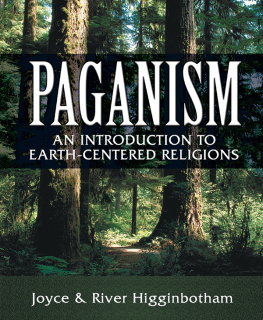
Acknowledgments

I wish to offer special thanks to Andras and Deirdre Arthen of the Earthspirit Community, Isaac Bonewits, and Oberon G'Zell for their assistance and encouragement in making the crucial first contacts for this book. I wish to acknowledge Mark Roblee for opening the gates to the Faery tradition.
Thanks are due to Ernie Urvater and to Paul Eagle for their technical assistance. Untold gratitude is due to Ted Mills, who has unfailingly encouraged me in all of my efforts. I also wish to thank Lee Wood and John Matthews for their sensitive and skillful editing.
In particular, I wish to thank all of the Pagans who opened their hearts and gave of their time. Everyone has been most gracious.
Blessings of Stone, Earth, Fire, Sun, Water, Sea, Wind, and Sky.
Willow (Ellen Evert Hopman)
I dedicate this book to my son Emrys and his generation. May they live and grow in a world that celebrates diversity rather than fears it.
Lawrence Bond
Foreword

W ho are the Pagans? The delightful book you are holding seeks to answer this question through interviews with modern Wiccans, Druids, and other followers of nature-centered spirituality. The answer lies between the lines and behind the spoken words. For many of you, it will validate, as it did for me, what you already know from years of study or practice: Pagans, as the title says, are people.
What kind of people is a question I tried to answer in social psychology, a discipline concerned with the behavior of groups. Although a lifetime of spiritual study left the answer in my heart, my brain needed to find the answer in terms that science would understand. I was surprised by the resistance I encountered in making metaphysical beliefs the topic of my doctoral dissertation. My advisor was concerned about my marketability with such a specialization. Other faculty warded off the idea with greater or lesser degrees of nervousness: Some politely claimed they didnt have the time to work with any more students. Others said they just werent interested in the subject and didnt want to be associated with my project. One was openly hostile to the idea. In the end, it took me nearly two years to find four faculty members willing to supervise my study.
Even more surprising than the academic resistance I encountered was the response within the Pagan community. While more than five hundred people completed and returned my survey, I also uncovered a great deal of distrust and even hostility among a small minority who feared another witch-hunt. Some were afraid that I intended to discredit Paganism by developing an unflattering psychological profile. Others worried about personally becoming targets of persecution. A few complained that my standard questions were too biased by Aristotelian/Christian logic to capture any valuable information. Considering I can only report feedback from returned surveys, one can only wonder what was running through the heads of those people who relegated my questionnaire to the recycling bin. Given the hostility on both sides of the magnifying glass, the lack of research specifically targeting Pagan populations is unsurprising.
The earliest research on metaphysical beliefs dates back to the first half of the twentieth century, when psychology was still in its infancy. Several professors noted that better students believed in fewer superstitions, so they erroneously lumped together superstition, witchcraft, and magic, and prematurely concluded that all these beliefs were more prevalent among the unintelligent. This lead to the marginality hypothesis, which claims that believers are either members of small, socially disenfranchised groups that are too uneducated to see the foolishness of their beliefs or are so desperate to believe in something that they cant exercise proper judgment. Some of these socially disadvantaged groups included women, African Americans, the young, and the poor. Alas, this theory allowed bigotry to pass for science.
Most studies compounded this bias with a surprising level of ignorance. Questions about metaphysical beliefs were frequently insulting, inaccurate, or both. While the psychologists were asking Do you believe in witches? the witches were doubtless contemplating whether they believed in psychologists. Few witches ever got to express their doubts because most surveys went to freshman psychology students, a practice which makes about as much sense as surveying men about childbirth. To nobodys surprise, these studies offer little support for the marginality hypothesis.
Of the few well-conducted studies available, none focus on Pagans exclusively. Instead, they take a broader look at psychic fairs, Theosophy, or readers of the now-defunct occult magazine, Gnostica. From these studies emerges a picture of the generic occult practitioner as someone who tends to be older, white, female, better educated, and more affluent. This is a far cry from the stereotypically young, black, uneducated, and poor college freshmen the marginality hypothesis imagines.
Believers are actually far more often part of the mainstream than of the social fringes to which speculation often seeks to relegate them. In America today, believers in astrology outnumber the membership of any single religious denomination. Eight out of ten people believe in ESP. Every year, the metaphysical community spends $100 million in books and $27 billion in alternative medicine. The estimated number of Pagans worldwide increases every year, and Megatrends 2000 predicts that alternative and New Age faiths like Paganism will become the boom religions of the twenty-first century.
In my study, I targeted the Pagan/magical community because I wanted the real thing: people whose lives were actually shaped by their beliefs. The typical participant was a thirty-eight-year-old white female with three and one-half years of college. In childhood, half of my sample had been raised Protestant and another third had been raised Catholic. They kept their minds open to new beliefs and actively pursued new truths. Finally, they were far more likely than nonbelievers to have had a transformative metaphysical experiencea personal encounter with anything from angels to ghosts to UFOsand to see control over their lives coming from within, rather than without.
The neo-Pagan movement that I encountered is a dynamic entity, whose origins are part modern invention and part adaptation of tradition. As such, many participants in Paganism forge a unique path, as is evident from the variety of opinions and practices described in this book. This quest for spiritual fulfillment can lead in many different directions, some strange and fantastic, some challenging and frightening. The path may call for a study of ancient traditions such as Druidism (see The New Druids). It may revive nearly forgotten concepts like the Shekinah, the Great Mother energy of the Kabbalah (see the interview with Elie in Paganism from Norway, Greece, Egypt, Israel, and Italy), and the sacred prostitute (see Sacred Prostitutes). For others answers may lie in modern sources, including the fantastic fiction of Robert Heinlein (see The Church of All Worlds). It may involve adapting old ways to new or unusual situations, as among military Pagans (see Military Pagans). Or it may find a union in politics (see The Politics of Persecution) or feminism (see the interviews with Starhawk, Margot Adler, and Z. Budapest in Writers). Whatever the path, its travelers are reinventing the traditions and rites of passage which are so widely absent in the West.
Next page
